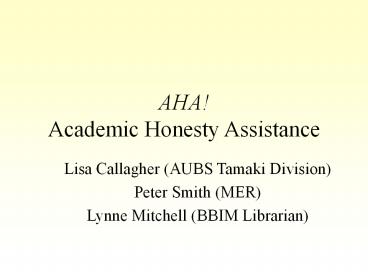AHA! Academic Honesty Assistance - PowerPoint PPT Presentation
Title:
AHA! Academic Honesty Assistance
Description:
To encourage academic honesty and reduce plagiarism. Academic honesty as a higher education issue ... Addressing plagiarism through learning and teaching ... – PowerPoint PPT presentation
Number of Views:72
Avg rating:3.0/5.0
Title: AHA! Academic Honesty Assistance
1
AHA!Academic Honesty Assistance
- Lisa Callagher (AUBS Tamaki Division)
- Peter Smith (MER)
- Lynne Mitchell (BBIM Librarian)
2
Agenda for todays presentation
- What is AHA!
- Why does UoA need an academic honesty tutorial?
- How is AHA! designed, delivered and assessed?
- Results from the pilot study
- Where should AHA! go?
3
AHA!
- Interactive self-paced tutorials and on-line
assessments - Its purpose
- To introduce students to the role of university
- To induct students into UoAs academic
environment, including our implicit expectations,
policies, processes and practices - To provide practical research, noting-taking and
referencing skills - To encourage academic honesty and reduce
plagiarism
4
Academic honesty as a higher education issue
- Plagiarism is a significant issue in higher
education (Hauptman, 2002., Campbell, Owens Swift
and Denton, 2000) - A number of factors are attributed to its
increase - Digital sources, electronic paper mills and the
Internet (Born, 2003., Park, 2003) - Changing student demographic and economic reasons
for participating in higher education (McCabe et
al, 1992-1999)
5
Academic honesty at UoA
- Recent research (Mills, in progress) from UABS
reports students awareness of and participation
in plagiarism - Existing procedures to guard against cheating and
plagiarism ( Guidelines Conduct of Coursework)
http//www2.auckland.ac.nz/teachingandlearning/Doc
uments/Coursework20Conduct20Guidelines.pdf - Concerned with action not intent of the action
- Policy that outlines process after the event
6
Addressing plagiarism through learning and
teaching
- Academic honesty is socially constructed
knowledge (Payne and Nantz,1994) - Students must experience institutional values in
order to understand why they are different from
other institutional and social settings
(Hauptman, 2002)
7
Design principles
- Students engage themselves in the context and
values that underpin academic honesty at UoA - Students learn in their own time, pace and space
- Students transfer their understanding of academic
honesty directly into other aspects of their
academic life - This is achieved in a resource (people, time, )
sustainable model
8
AHA! Delivering these principles
- Core modules
- The Academic Environment
- Academic Honesty
- University of Auckland Policy
- Including study strategies to avoid plagiarism
- Additional module
- APA referencing style (currently available)
- Accessed from Cecil, available 24/7
- Lo-speed option available
- Interactive with pop ups, true/false questions,
interviews, student-oriented ethical scenarios
9
AHA! Assessment
- Formative assessment embedded in modules
- True/false questions
- To go.. for more information
- Ethical questions to ponder
- Summative assessment
- Multi-choice quizzes at end of each module
10
Results of pilot study in MGMT.101
- Traditionally referencing was taught in a one
hour tutorial and supported by dept document on
referencing - This semester 982 stage I students were required
to complete 31 modules and gain at least 80 in
each quiz prior to submitting a 20 essay
11
Qualitative evidence
- Number of students failing the assignment
because of plagiarism (i.e. getting zero) - Without AHA 8.5
- With AHA 5.5
- Thats a difference of about 30 people
- Quality of referencing and citation
- Much improved, significantly better
12
Quantitative evidence Intra-Course
13
To put it another way
14
Quantitative evidence Inter-Course
15
Student perceptions
- It should be made compulsory in every courses at
the University of Auckland. - make my reference more correct and fast
- I found it very helpful for preparing reference
list for essay writing.
16
Where should AHA! go?
- Our Vision
- AHA! is actively used by all courses within the
University of Auckland - Currently negotiating with library services to
take over marketing and management of AHA! - Investment in product likely to be demand-driven
- Discipline staff needed to adapt AHA! and
implement in classes































